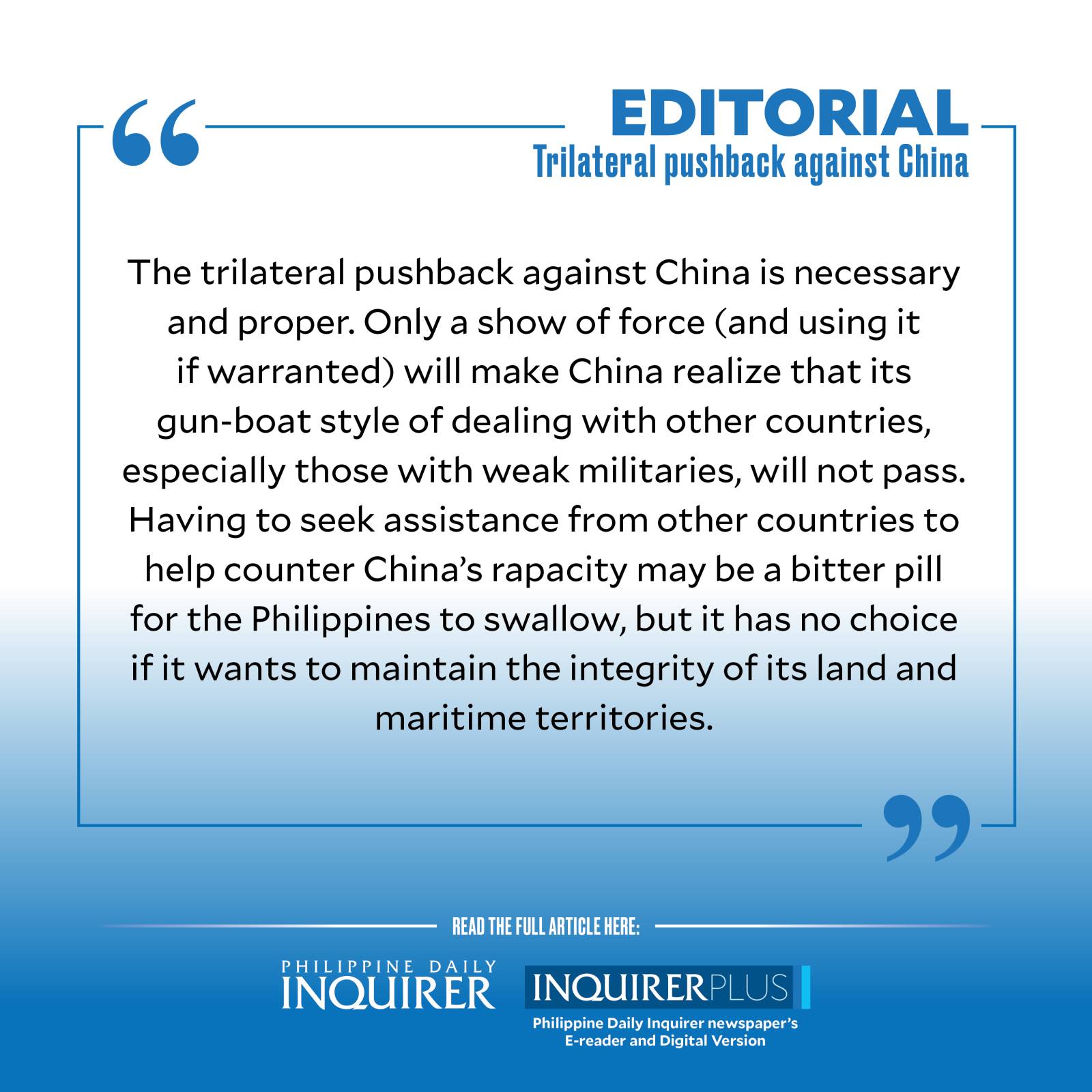Trilateral pushback against China

Stripped of diplomatic verbiage and despite disclaimers to the contrary, there is no question the cooperation agreement entered into recently by the Philippines, the United States, and Japan is directed at China.
While it is true that the leaders of the three countries discussed infrastructure and investment plans, e.g., the Luzon Economic Corridor and Open Radio Access Network programs in the Philippines, the principal objective of that unprecedented meeting was how to manage China’s aggressive actions in this region.
Upon his arrival from the US, President Marcos said the meeting gave him an “… opportunity to update President Biden and Prime Minister Kishida on the latest developments in the South China Sea, including the recent incidents at the Ayungin Shoal.”
He further stated that he and President Joe Biden reaffirmed their commitment to the 72-year-old Mutual Defense Treaty between the Philippines and the US.
Expansion of US military activities
Ahead of that meeting, Biden announced that he had asked the US Congress to allocate an additional $128 million for infrastructure projects in Philippine military bases where the US intends to preposition military personnel and equipment pursuant to the RP-US Enhanced Defense Cooperation Agreement.
It does not take rocket science to understand that the expansion of US military activities in the Philippines is aimed at foiling China’s possible military adventurism in the area.
As expected, China, through its embassy in Manila, expressed dismay over the results of the trilateral meeting and in its usual bravado style, called on the Philippines “… not to collude with nonregional forces or it will be used as a pawn against China, only to be discarded.”
Complete repudiation
That meeting by Mr. Marcos with China’s most bitter adversaries in this part of the world must have hit a really raw nerve as it represented a complete repudiation of the appeasement (and fawning) policy of his predecessor toward China.
But the Philippines cannot be faulted for seeking the assistance of the US, Japan, Australia, and other countries in asserting its rights over its exclusive economic zone (EEZ) which China has encroached on and claimed ownership to based on dubious historical reasons.
The Philippines does not have the military capability to counter China’s offensive acts in the West Philippine Sea (WPS) that have made a mockery of the earlier decision of an international maritime body recognizing the Philippines’ rights over the areas covered by its EEZ.
Seeking a diplomatic solution to the dispute over those territories is out of the question because China had shown by its actions in the past that it will stick through thick and thin (and damn the international community!) to its claim that the South China Sea, by its name, connotes total Chinese ownership over it.
Social club
It is futile, if not irrational, for the Philippines to seek the support of the Association of Southeast Asian Nations (Asean) to make China respect the rules of international law on its EEZ. Perish that thought because that would be like pulling hen’s teeth.
The majority of those countries are heavily dependent on their commercial trade with China and therefore would not dare do anything that would give the impression that they are supportive of the Philippine position on the maritime dispute.
They cannot be blamed for showing obeisance to China because it is in their best interests to do so and, in the normal course of global politics, national interests always take precedence.
Past events have shown that it’s every country for itself in Asean and the organization is no better than a social club that meets regularly with pomp and pageantry to give a semblance of unity among its members.
Trilateral cooperation
For strategic reasons, the three countries did not disclose how they plan to deal with China’s efforts to flex its muscles in parts of seas over which the Philippines and Japan have sovereign or commercial rights.
No doubt, the trilateral cooperation would require, among others, the US and Japan making available to the Philippines or assisting it in securing additional military hardware to beef up its maritime resources.
We may even see more frequent naval exercises by the three countries in the WPS and international waters to openly challenge China’s illegal claim of ownership.
The trilateral pushback against China is necessary and proper.
Only a show of force (and using it if warranted) will make China realize that its gun-boat style of dealing with other countries, especially those with weak militaries, will not pass.
Having to seek assistance from other countries to help counter China’s rapacity may be a bitter pill for the Philippines to swallow, but it has no choice if it wants to maintain the integrity of its land and maritime territories.
















